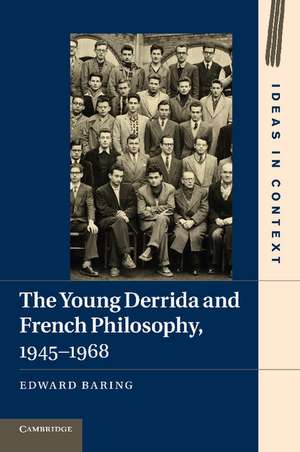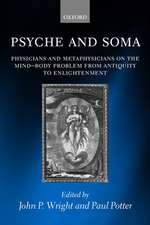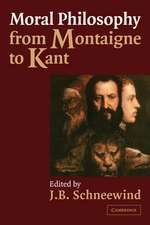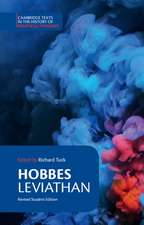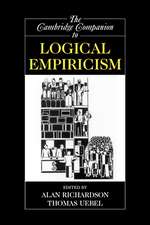The Young Derrida and French Philosophy, 1945–1968: Ideas in Context, cartea 98
Autor Edward Baringen Limba Engleză Paperback – 22 ian 2014
| Toate formatele și edițiile | Preț | Express |
|---|---|---|
| Paperback (1) | 239.27 lei 6-8 săpt. | |
| Cambridge University Press – 22 ian 2014 | 239.27 lei 6-8 săpt. | |
| Hardback (1) | 700.20 lei 6-8 săpt. | |
| Cambridge University Press – 12 oct 2011 | 700.20 lei 6-8 săpt. |
Din seria Ideas in Context
- 9%
 Preț: 592.57 lei
Preț: 592.57 lei -
 Preț: 200.63 lei
Preț: 200.63 lei -
 Preț: 200.27 lei
Preț: 200.27 lei -
 Preț: 178.15 lei
Preț: 178.15 lei -
 Preț: 200.37 lei
Preț: 200.37 lei -
 Preț: 200.41 lei
Preț: 200.41 lei -
 Preț: 230.08 lei
Preț: 230.08 lei -
 Preț: 240.27 lei
Preț: 240.27 lei - 9%
 Preț: 627.25 lei
Preț: 627.25 lei -
 Preț: 224.34 lei
Preț: 224.34 lei - 11%
 Preț: 695.06 lei
Preț: 695.06 lei - 11%
 Preț: 693.36 lei
Preț: 693.36 lei - 9%
 Preț: 626.77 lei
Preț: 626.77 lei - 9%
 Preț: 626.34 lei
Preț: 626.34 lei - 11%
 Preț: 626.38 lei
Preț: 626.38 lei -
 Preț: 246.32 lei
Preț: 246.32 lei - 8%
 Preț: 530.32 lei
Preț: 530.32 lei - 9%
 Preț: 592.79 lei
Preț: 592.79 lei - 27%
 Preț: 648.34 lei
Preț: 648.34 lei - 9%
 Preț: 592.05 lei
Preț: 592.05 lei -
 Preț: 186.95 lei
Preț: 186.95 lei -
 Preț: 188.70 lei
Preț: 188.70 lei -
 Preț: 192.99 lei
Preț: 192.99 lei -
 Preț: 160.82 lei
Preț: 160.82 lei - 11%
 Preț: 583.02 lei
Preț: 583.02 lei -
 Preț: 178.45 lei
Preț: 178.45 lei - 11%
 Preț: 601.91 lei
Preț: 601.91 lei - 11%
 Preț: 585.25 lei
Preț: 585.25 lei -
 Preț: 185.17 lei
Preț: 185.17 lei -
 Preț: 276.77 lei
Preț: 276.77 lei - 11%
 Preț: 583.56 lei
Preț: 583.56 lei -
 Preț: 179.68 lei
Preț: 179.68 lei - 11%
 Preț: 584.90 lei
Preț: 584.90 lei -
 Preț: 375.56 lei
Preț: 375.56 lei -
 Preț: 284.17 lei
Preț: 284.17 lei -
 Preț: 285.54 lei
Preț: 285.54 lei -
 Preț: 298.92 lei
Preț: 298.92 lei -
 Preț: 282.87 lei
Preț: 282.87 lei -
 Preț: 288.04 lei
Preț: 288.04 lei -
 Preț: 284.56 lei
Preț: 284.56 lei -
 Preț: 273.35 lei
Preț: 273.35 lei
Preț: 239.27 lei
Nou
Puncte Express: 359
Preț estimativ în valută:
45.78€ • 47.93$ • 37.88£
45.78€ • 47.93$ • 37.88£
Carte tipărită la comandă
Livrare economică 05-19 aprilie
Preluare comenzi: 021 569.72.76
Specificații
ISBN-13: 9781107674622
ISBN-10: 110767462X
Pagini: 350
Ilustrații: 1 b/w illus.
Dimensiuni: 152 x 229 x 19 mm
Greutate: 0.47 kg
Editura: Cambridge University Press
Colecția Cambridge University Press
Seria Ideas in Context
Locul publicării:New York, United States
ISBN-10: 110767462X
Pagini: 350
Ilustrații: 1 b/w illus.
Dimensiuni: 152 x 229 x 19 mm
Greutate: 0.47 kg
Editura: Cambridge University Press
Colecția Cambridge University Press
Seria Ideas in Context
Locul publicării:New York, United States
Cuprins
Introduction; Part I. Derrida Post-Existentialist: 1. Humanist pretensions: Catholics, Communists and Sartre's struggle for existentialism in post-war France; 2. Derrida's 'Christian' existentialism; 3. Normalization: the École Normale Supérieure and Derrida's turn to Husserl; 4. Genesis as a problem: Derrida reading Husserl; 5. The God of mathematics: Derrida and the origin of geometry; Part II. Between Phenomenology and Structuralism: 6. A history of différance; 7. L'ambiguité du concours: the deconstruction of commentary and interpretation in Speech and Phenomena; 8. The ends of man: reading and writing at the ENS; Epilogue.
Recenzii
'In The Young Derrida, we find a careful reconstruction of the intellectual and political climate in which Jacques Derrida developed his famous idea of deconstruction. In particular, Baring shows us how the development of deconstruction is involved in the history of humanism in postwar France going up to the May '68 uprisings. Indeed, Baring's readings of Derrida's early books on Husserl's phenomenology are exemplary. With an elegance rarely seen, Edward Baring has managed to weave cultural history with philosophy. The Young Derrida is a magnificent book.' Leonard Lawlor, Sparks Professor of Philosophy, Pennsylvania State University
'Drawing on a wealth of previously untapped sources and displaying a sure-handed command of postwar French philosophy and theology, Edward Baring presents us with a new and arresting interpretation of Derrida's origins. Contrary to conventional wisdom, he was far more enmeshed in Christian antihumanist thought than its Jewish counterpart, and retained many of its premises through all the changes of idiom in his later work. The Young Derrida masterfully exemplifies the power of intellectual history to illuminate even the darkest corners of philosophical development.' Martin Jay, Sidney Hellman Ehrman Professor, University of California, Berkeley
'It is hard to imagine this work being superseded as an intellectual biography of Jacques Derrida, and indeed of post-war French intellectual history, up to the May '68 uprisings.' Patrick Madigan, The Heythrop Journal
'… complex, learned … [an] erudite book.' Jonathan Judaken, The Journal of Modern History
'The Derrida that Baring reconstructs is not the one we thought we knew. His reconstruction is so persuasive that the book succeeds in revising interpretations that have become truisms in Derrida scholarship … The book impresses at every level … Baring is diligent at getting things right.' Carolyn Dean, Modern Intellectual History
'[An] exciting reinterpretation of Derrida's early years.' Emile Chabal, Books and Ideas
'[This] is an outstanding historical account. The book combines a comprehensively informed sensitivity for the context with a masterly knowledge of Derrida's thought and the broader intellectual field in which he worked. Baring's work succeeds not only in enriching enormously our knowledge of Derrida's environment in those formative years of his philosophical development. With his artful philosophical readings, that are closely entwined with a contextual history of ideas, it changes our understanding of his thought.' Warren Breckman, translated from Zeitschrift für Ideengeschichte
'Drawing on a wealth of previously untapped sources and displaying a sure-handed command of postwar French philosophy and theology, Edward Baring presents us with a new and arresting interpretation of Derrida's origins. Contrary to conventional wisdom, he was far more enmeshed in Christian antihumanist thought than its Jewish counterpart, and retained many of its premises through all the changes of idiom in his later work. The Young Derrida masterfully exemplifies the power of intellectual history to illuminate even the darkest corners of philosophical development.' Martin Jay, Sidney Hellman Ehrman Professor, University of California, Berkeley
'It is hard to imagine this work being superseded as an intellectual biography of Jacques Derrida, and indeed of post-war French intellectual history, up to the May '68 uprisings.' Patrick Madigan, The Heythrop Journal
'… complex, learned … [an] erudite book.' Jonathan Judaken, The Journal of Modern History
'The Derrida that Baring reconstructs is not the one we thought we knew. His reconstruction is so persuasive that the book succeeds in revising interpretations that have become truisms in Derrida scholarship … The book impresses at every level … Baring is diligent at getting things right.' Carolyn Dean, Modern Intellectual History
'[An] exciting reinterpretation of Derrida's early years.' Emile Chabal, Books and Ideas
'[This] is an outstanding historical account. The book combines a comprehensively informed sensitivity for the context with a masterly knowledge of Derrida's thought and the broader intellectual field in which he worked. Baring's work succeeds not only in enriching enormously our knowledge of Derrida's environment in those formative years of his philosophical development. With his artful philosophical readings, that are closely entwined with a contextual history of ideas, it changes our understanding of his thought.' Warren Breckman, translated from Zeitschrift für Ideengeschichte
Notă biografică
Descriere
Edward Baring sheds fresh light on Jacques Derrida, one of the most influential yet controversial intellectuals of the twentieth century.
